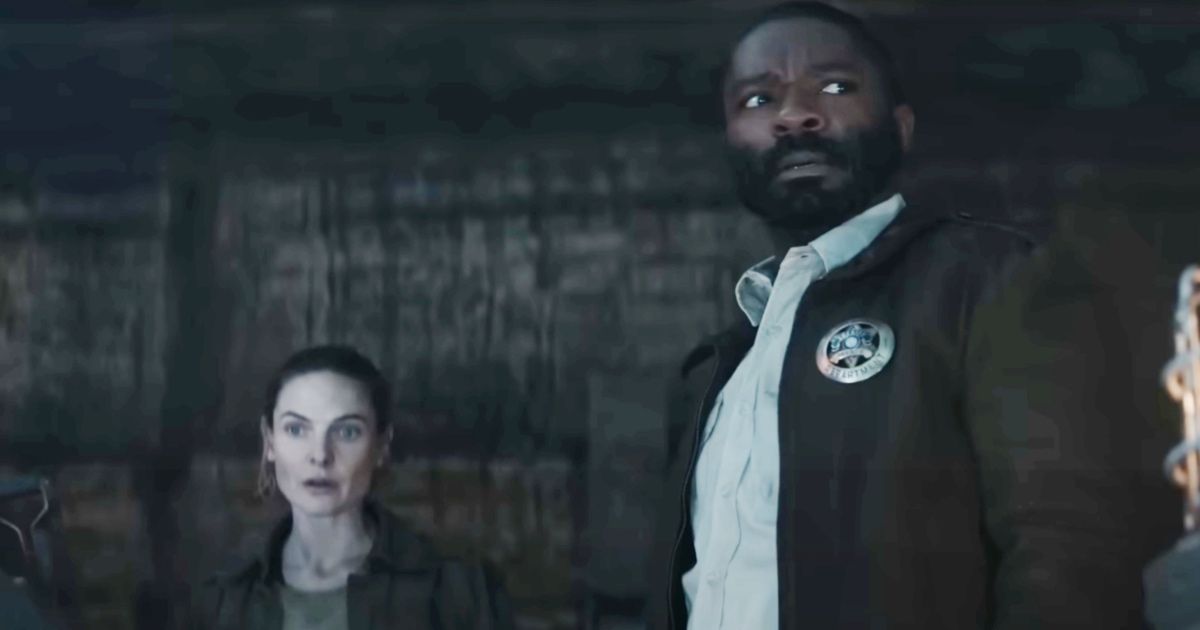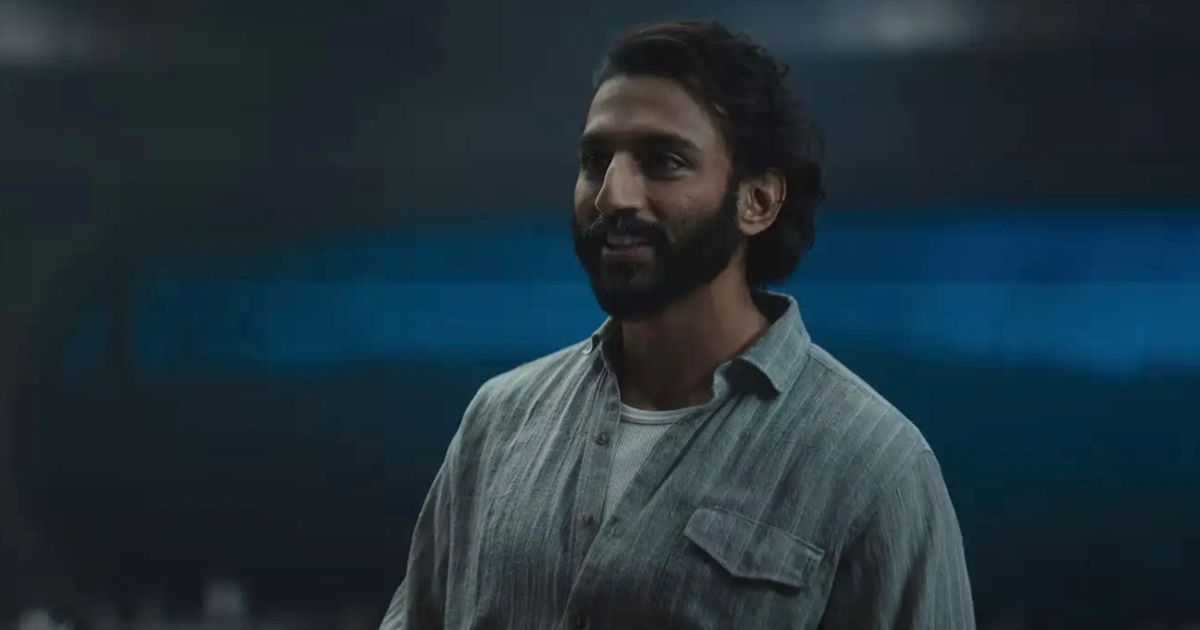Warning: This article contains spoilers for episode one of Silo.Silo certainly captured viewers’ attention with its first episode. Apple TV+’s inventive new dystopian drama is set far in future and revolves around the last 10,000 people on Earth who live in an enormous underground silo. “Outside,” people have been told, is dangerous and bleak, the result of what appears to be an environmental disaster. The chilling voiceover in the beginning of the series foreshadows the intensity to come.
We do not know why we are here. We do not know who built the Silo. We do not know why everything outside the Silo is as it is. We do not know when it will be safe to go outside. We only know that day is not this day.
Episode one shifts back and forth in time. We find the silo’s Sheriff Holston (David Oyelowo) declaring he wanted to go outside — apparently when you say you want to go outside, you must. Nobody stops you, but there’s no turning back from that decision. Holston suits up. He emerges from the deep depths of the silo. He walks outside and cleans the camera lens, giving viewers a broad view of a lifeless world. But Holston’s perception of the world inside his helmet is one of beauty. The world appears sunny and bright. He takes off his helmet. Bad idea. He soon perishes as the silo’s occupants watch on in horror in a gathering area.
Meanwhile, back in the past, Holston and his wife, Allison (Rashida Jones), are granted permission to conceive. There’s a one-year window. Doctors remove Allison’s birth control device. Or do they? Later, we find her bloody after she removed her own birth control device. She confronts Holston about the lies they’ve been told and, later, in front of a crowd, bellows: “I want to go out.” She seals her fate. Viewers were also introduced to the show’s headliner, Rebecca Ferguson, who plays mechanical engineer Juliette Nichols. Juliette is convinced her dear friend George was murdered and questions the belief that he died by suicide. George knew something. A deeper truth about the silo, perhaps. And she’s determined to find that out.
Ahead of the show’s second episode, airing Friday, Silo stars Avi Nash (The Walking Dead )and Chinaza Uche (Dickenson) shared more with MovieWeb about their roles in the series, which is based on Hugh Howey’s bestselling novels.
Chinaza Uche on Playing Paul in Silo
MovieWeb: What a great ensemble cast here. Rebecca Ferguson, Common, Harriet Walter, David Oyelowo, Tim Robbins, and others. You play Paul, who is part of the judicial department, but eventually becomes deputy to the new sheriff. What were your thoughts on the role?
Chinaza Uche: There are two answers to that. The first is, I was always excited by the character Paul Billings, because I could just feel like I understood what’s happening. This man really believes in something in his core, and it’s going to be challenged. And that’s just going to be an interesting ride to take. I was just blown away by the size, the scope, the details, and all the rules of this [silo] world when I was given the pilot episode to read when I auditioned. It’s a pretty searing human element. That pilot is heartbreaking, in many ways, I wanted to see more.
MW: Tell us more about Paul and his role in the Silo universe?
Uche: So, the silo [in the show] is based around this book called “The Pact,” which is a bunch of laws that were left by their founders. And Paul has done everything in his power to learn and love this book. He believes in the society, he believes in the way it works. And over the season, he’s forced to really ask some hard questions and look at a lot. That is so resonant. We all have those things that we’re like, “What is this? I’ve built so much of how I see the world on this. Have I taken the time to challenge it? I might not prove it wrong. But to just take that look.” That was an inspiring question to sit with.
MW: In talking to you, it’s clear you seem pretty deep and grounded. What kinds of things from your real life helped you build this character?
Uche: For me, the first thing on my mind is breathing. I was just shooting some intense scenes, and just actually noticing that and trying to be present with what’s happening because I have a brain that can just, you know, spin, spin, spin. I’ve been to a lot of therapy. Some of the places Paul goes are definitely challenging, but they don’t feel outside myself. I mean, we’ve all had those days, where you’re like, it’s all crumbling down. Then you just try to sit in that for a little bit longer. I guess, genuinely, I’m also reminded how much people can take, how much the human body can move through, and how much we can carry. That’s what he’s doing. What’s interesting with Paul is that he doesn’t have a lot of tools to work with. They’re not talking about mental health in the silo in the way that we’re talking about it now. So, it was kind of unlearning that stuff and being like, “This guy is just sitting under this pressure, every single day without an outlet. What does that feel like?”
MW: So, let’s flash forward 200 years. Let’s say Earth has changed so dramatically. How do you think you’d fair in a real-life silo?
Uche: I have to be fair. Terribly. The Chinaza you’re talking to right now needs to run in the fresh air. He does. But if it was all I’ve known, if I’d never seen anything else… I think what’s really surprising is if that’s all you know, you might be totally fine. It’s kind of crazy.
Avi Nash Explains His Take on Playing Lukas
MW: You come from a noteworthy role in The Walking Dead. You’re an IT expert and astronomer here and your bond between Rebecca Ferguson’s character, Juliette, becomes significant as the series rolls out.
Avi Nash: I always hope to bring something that’s different from myself to every character I play. And in this case, with Lukas it’s his optimism and hope, and it’s something that I wish I always shared, but I don’t always do. So, I tried to lean into that, and really allow him to be a beacon of light and hope in this dark and deep silo. I also appreciated that his journey as a character is not easy. He doesn’t always say the right thing or do the right thing or make the right decisions. And I think that those mistakes, and those flaws, are fascinating to play, because it gives you somewhere to grow from.
MW: What was your immediate reaction to the script and what do you feel audiences will embrace?
Nash: I thought it was a really fascinating story. It was really prescient story for the world that we live in, and a story that dealt with truth and the responsibility of truth telling, and who deserves to have access to the truth and who doesn’t. Because, you know, we live in a post-truth age now, where it’s up for debate. What are the facts and what’s not? That’s a really important question to ask ourselves. I spoke to showrunner Graham Yost (Speed), who is a born and bred storyteller. I fell in love with him. He just started telling me about how these characters would grow and how they would come together and what the story was, and the cast that he’d assembled. Tim, and Rebecca, and Common. I was like, “Okay, I want to do this.” As an artist, I always want to be around other passionate people because I think I can learn from them and grow from them.
MW: Can you share more about any specific challenges during some of those scenes between Rebecca Ferguson and Tim Robbins, whose character is definitely one to watch.
Nash: Working with Rebecca and Tim is memorable, just the way they work. I suppose with Rebecca, there was a lot of this sort of dance to how these characters would interact. We tried to find different ways because we were testing each other as characters in those scenes and trying to break through the ice and find chemistry. And with Tim Robbins, you know, it was a real joy to see how he works and how he would take my take, and sort of taste all the words differently. I sat on the other side of this desk from him, and it’s a bit of an acting Masterclass to watch him explore and discover these things.
MW: Asking the same question we asked Chinaza: How would you handle being in a silo if humanity was sent to live in one?
Nash: I think I would have to work in mechanical, probably. I would have to keep my hands busy and break my back and be too tired when I go to bed at night to really think about these questions of the silo. Because the oppressiveness of living in a fixed space like that would eventually get to me unless I could somehow convince myself that what I was doing was really important for the safety and security of all.
MW: What’s one thing we, as a race, could do now to prevent living in a silo?
Nash: Probably stop drilling for oil and overfishing and take care of the planet more. That’s it. So, you know, we don’t have to live inside a giant cylinder under the ground.
Silo streams on Apple TV+ with new episodes Friday.
Stay connected with us on social media platform for instant update click here to join our Twitter, & Facebook
We are now on Telegram. Click here to join our channel (@TechiUpdate) and stay updated with the latest Technology headlines.
For all the latest Education News Click Here


